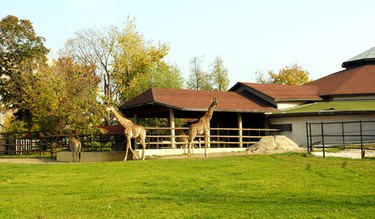Things You'll Need
Lawnmower
Rake
Aerator
Fescue grass seed
Spreader

Bermuda grass is a warm-season grass that thrives in the heat of midsummer. It makes the summer lawn look lush. But it does not do well in cooler weather and may need to be overseeded in the fall. Some gardeners prefer to replace it with fescue, a cool-season grass that does best in the fall, winter and spring. To make the switch as the weather cools down, overseed the Bermuda grass with the fescue. The cool bluish fescue will perk up the bare spots left by the summer Bermuda grass.
Step 1
Mow the Bermuda grass to 1 1/2 to 2 inches tall. The short grass will allow sunlight reach the new fescue seed.
Video of the Day
Step 2
Remove thatch from the lawn. Rake the grass to both pull up thatch and roughen the dirt so the fescue seeds can take hold.
Step 3
Aerate the Bermuda grass. Aerator machines can be rented from local home and garden shops. Walk over the lawn with the machine as you would a lawnmower.
Step 4
Measure the size of the lawn to determine how much seed is required. Fescue seed package directions will recommended a rate for overseeding.
Step 5
Broadcast the fescue seed over the Bermuda grass lawn with a spreader.
Step 6
Water the fescue seed every day. After the new grass sprouts , provide 1 inch of water per week.
Video of the Day